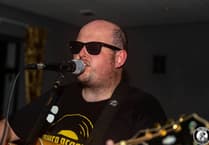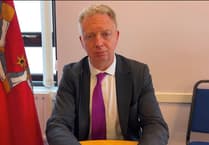He puts in around 95 hours a week, working from 9am to 3am, and speaks multiple languages, including Russian and Japanese.
His company operates in 13 countries on six continents and boasts a network of some of the highest billing recruiters. Welcome to the world of the global headhunter.
Cosmo Currey says the first thing people ask him about is his name - ’Cosmo? Have we got it right?’ They ask incredulously.
In Russia, people would take it ’incredibly offensively’, apparently thinking he was messing with them. But it’s actually perfectly appropriate for the son of a renowned astrologer, Robert Currey.
Cosmo says: ’Astrology has been a part of our lives growing up and it’s an interesting insight into life and the world.
’I think with a name like Cosmo and a family of astrologists it was unlikely that it was going to be a completely normal path of life in our house, it was going to be a bit different.’
And, no, he does not check the star sign of prospective recruitment candidates.
He says: ’The key for me is going on the individual and understanding the motivation behind them. It’s often not what we say that’s our motivator, it’s what’s underneath that. I think the separation between good recruitment and great recruitment is to be able to cut through that.
’But I wouldn’t be averse to using astrology if it was going to make a stronger match.’
He got into recruitment almost by accident when he arrived in Amsterdam after three years in Russia and was offered a job by an international recruitment firm.
He wasn’t an instant success. ’I was terrible at it, terrible,’ he says. ’I didn’t make a placement for six months. They had fired most of the office: their idea was you come in, sink or swim, and if you don’t do well in the first few months you’re out. I struggled.’
But the managing director saw something in Cosmo. ’He said: "I think you’ve got something here - let’s see if you’re prepared to put the effort in." So we stayed in the office every day after work and headhunted into America and we would sit there and he would train me.
’We went from that to two and half years later I was the group’s highest biller.’
So how does it work in this rarefied world where prospective candidates are valued like racehorses or fine art?
Cosmo set up his company, Van Kaizen, with business partner Graeme Brooks, specialising in the gaming, technology and finance sectors. For him, it all begins with the clients, companies who are looking to add value to their business or even, he says, to send a signal to the marketplace.
He explains: ’The way it works is, you first have to understand what it is they need. It’s trying to understand where the company is going, what the key factors are - what are the things they haven’t thought about.
’For example you might talk to somebody who says: "We want someone to look at business development in European markets" and you ask what the plans are for their European markets. Which locations are key?
’And all of a sudden you realise that Spanish and French are going to be absolutely fundamental, so it becomes more of a consultancy piece, initially, to understand the wider requirements.
’The next step, as opposed to going through a bank of people or looking at a database - and this is where we probably separate from a high-street recruiter - is to ascertain where the core competitors of the business are, within the locations that we’re looking at, and then you start the search, so that you would know you’re presenting candidates that are doing the same job at a competitor, who know the market inside out, and who can walk into the job.’
LinkedIn is where the search often begins: ’LinkedIn is a massive tool for headhunters and is where the majority of candidates come from but you also count on your personal network and people that you know who are not so much looking for a job themselves but who will be able to refer someone they’ve worked with, or a friend.’
Having made the initial connection through LinkedIn, Cosmo then reverts to using WhatsApp which, he says, ’accounts for about 95% of the business we do.’
He is very much aware that, when he sounds out a prospective candidate, initially in quite a relaxed, informal manner, he is nevertheless representing his client and becoming the voice of their company in the most positive way.
Prospective candidates are rarely averse to having the conversation:.
’You are moving someone from one company to another; increasing their base salary, and representing a company that you think is exciting and dynamic. And that’s a free service that you give to a candidate so, in a way, it’s a win-win situation for them.’
Van Kaizen was set up less than two years ago, just before Covid, and has grown exponentially since then. Cosmo recalls: ’It was a scary time, but gaming did relatively well during Covid because people had more time at home, because they had that surplus income, and because there was a level of boredom and they wanted to play.
’The sports betting companies struggled the most because sports was on hold but the casino/slots businesses expanded exponentially - real crazy growth - and we were lucky enough to be at the forefront of that.’
Lockdowns also threw up the interesting scenario of recruiting someone who potentially would not be able to go into their new office for months.
Cosmo says: ’It changed the landscape. I would say the gambling industry is not as progressive in terms of remote working. For such a progressive industry you would have thought that they would be - I would say it’s only about 30% of our clients that have taken up remote working.
’And offering remote working will become a competitive advantage, no question. I think it’s only a question of time before all businesses will go that way.’
Van Kaizen is headquartered in the Isle of Man for good reason. Cosmo says: ’Having worked for various recruitment firms I saw that the Isle of Man market was super exciting: there were great gaming companies set up and there was a real need for headhunting.
’We bring in people who have skills that just don’t exist here so we’re not competing with the local market, we’re not taking jobs away from anybody that’s here, we’re adding to the economy, and what we’ve found is that there was this real need and it was across the tech companies, not just the gaming firms.’
But he also wanted to build a network of top recruiters all around the world to work with him and he approached this in the same sort of way that one of his clients might think of trying to attract the top talent.
He says: ’We needed to find a way to make recruitment exciting to the top recruiters around the world, to create a model that gets people emotionally invested and driven to go out and succeed. We created an incredibly strong incentive - I don’t think there’s anything globally that comes anywhere near what we do. And that opened the door for us to be able to invite only the highest billing recruiters globally to come and join.’
As a profession it is, he adds ’a roller coaster’: one month you can make a huge amount of commission, the next month nothing at all, yet it appears, for Cosmo certainly, to be addictive.
He says: ’I do love it but I’m obsessive with my attention to detail: the idea of going to bed with an email I haven’t responded to or a draft I haven’t written - that gives me huge palpitations, I would feel extremely uncomfortable.
’When we started the company we decided that any major decision would need to be done in six hours, without question. It’s the biggest burden on businesses that I have worked for and I have come across: the speed.
’They lose employees, they lose candidates - the whole point of being in a senior position is to make that decision.’




